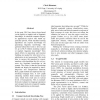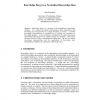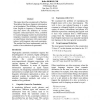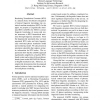444 search results - page 5 / 89 » Representing and Integrating Linguistic Knowledge |
SIGLEX
1991
13 years 10 months ago
1991
Drawing on a growing database of systematic relationships between word-senses, the authors argue that a significant class of these represent Lexical Implication Rules, a set of fo...
NAACL
2007
13 years 8 months ago
2007
In the past, NLP has always been based on the explicit or implicit use of linguistic knowledge. In classical computer linguistic applications explicit rule based approaches prevai...
DEXA
2000
Springer
13 years 11 months ago
2000
Springer
Knowledge ‘decay’ is a measure of the degradation of knowledge integrity. In a unified knowledge representation, data, information and knowledge are all represented in a single...
NAACL
2001
13 years 8 months ago
2001
This paper describes an approach to Machine Translation that places linguistic information at its foundation. The difficulty of translation from English to Japanese is illustrated...
COLING
2008
13 years 8 months ago
2008
Bracketing Transduction Grammar (BTG) is a natural choice for effective integration of desired linguistic knowledge into statistical machine translation (SMT). In this paper, we p...




